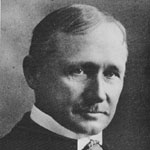
He believed that a major difficulty in labor relations was the lack of expression by managers of what they expected from the laborers. This, coupled with the resultant lack of understanding on the part of the employees, made management ineffective. It was customary for the workers to plan their own work, generally follow-up a pattern that they learned by watching others. In so far as it wasn’t dictated by the nature of the job, the order in which the operations were performed and the selection of tools was left entirely up to the worker. This slowed productivity. Taylor sought to find the ”one best way” for all the workers.
Out of Taylor’s research came recommendations to company executives that helped to increase the daily production of the steel mill from 12-1/2 tons to 47 tons per man As Taylor continued his studies, his interest turned more and more towards management training But Taylor’s opinion, labor-saving machinery, and mass production were worthless unless those who managed were able to keep pace with technical improvements.
Taylor was convinced that the vast majority of workers perceived labor-saving machinery and mass production as more of a threat to their jobs than a boon to the industry. He estimated that ”nineteen out of twenty workers firmly believe that it is in their best interests to go slow instead of fast.
They firmly believe that it is in their interest to give as little work in return for the money that they get as is practical.”
This fear on the part of workers, which Taylor originally identified, hasn’t been entirely dispelled from modern industry. Today one needs only reflect on how workers perceive the potential threat of such technologies as computers, telecommunications, and robots in the workplace. The fear that ”the faster you work, the more you produce, the sooner you’re out of a job” is still alive. It was Taylor’s view, however, that one of the obligations of management was to help workers understand that increased efficiency and output doesn’t lead to increased unemployment; rather, workers can actually improve their own lot in life.
Among Taylor’s various principles of scientific management, the most important stress that managers:
- Must be trained to use scientific principles in order to replace the old rule-of-thumb methods of solving problems;
- Should select and train their workers, rather than letting them choose their own work habits and procedures;
- Should delegate work responsibility as evenly as possible between themselves and their workers; and
- Should cooperate with workers to ensure that all the work is done in accordance with scientific principles.
One very important presumption underlies Taylor’s theory of scientific management: If the worker doesn’t meet management’s expectations, it’s management’s fault for not showing the person the right way to do the work.
[tag]filipino entrepreneur,management[/tag]



